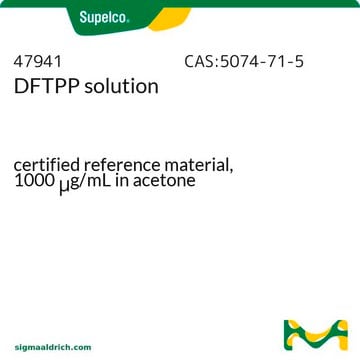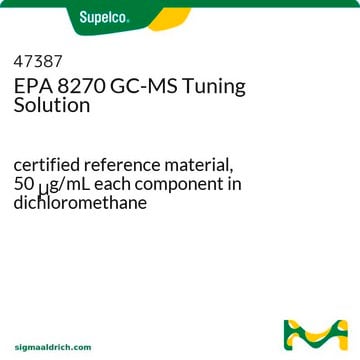442543
Décafluorotriphénylphosphine
analytical standard
Synonyme(s) :
Bis(pentafluorophényl)phénylphosphine, DFTPP, 2,3,4,5,6,2′,3′,4′,5′,6′-décafluorotriphénylphosphine
About This Item
Produits recommandés
Qualité
analytical standard
CofA (certificat d'analyse)
current certificate can be downloaded
Conditionnement
ampule of 100 mg
Technique(s)
HPLC: suitable
gas chromatography (GC): suitable
Pf
55-60 °C (lit.)
Application(s)
environmental
Format
neat
Température de stockage
2-30°C
Chaîne SMILES
Fc1c(F)c(F)c(P(c2ccccc2)c3c(F)c(F)c(F)c(F)c3F)c(F)c1F
InChI
1S/C18H5F10P/c19-7-9(21)13(25)17(14(26)10(7)22)29(6-4-2-1-3-5-6)18-15(27)11(23)8(20)12(24)16(18)28/h1-5H
Clé InChI
OYNXPGGNQMSMTR-UHFFFAOYSA-N
Vous recherchez des produits similaires ? Visite Guide de comparaison des produits
Description générale
Application
Mention d'avertissement
Warning
Mentions de danger
Conseils de prudence
Classification des risques
Eye Irrit. 2 - Skin Irrit. 2 - STOT SE 3
Organes cibles
Respiratory system
Code de la classe de stockage
11 - Combustible Solids
Classe de danger pour l'eau (WGK)
WGK 3
Point d'éclair (°F)
235.4 °F - closed cup
Point d'éclair (°C)
113 °C - closed cup
Équipement de protection individuelle
dust mask type N95 (US), Eyeshields, Gloves
Choose from one of the most recent versions:
Déjà en possession de ce produit ?
Retrouvez la documentation relative aux produits que vous avez récemment achetés dans la Bibliothèque de documents.
Notre équipe de scientifiques dispose d'une expérience dans tous les secteurs de la recherche, notamment en sciences de la vie, science des matériaux, synthèse chimique, chromatographie, analyse et dans de nombreux autres domaines..
Contacter notre Service technique







